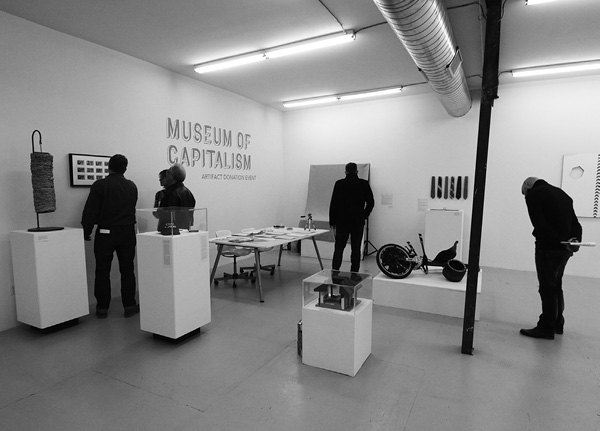
MUSEUM OF CAPITALISM: ARTIFACT DONATION EVENT
first performed on March 22, 2016
The Luminary, St. Louis, MO
ongoing performance for four days in 2016
FICTILIS
Oakland, CA
086452099i086452099n086452099f086452099o086452099@086452099f086452099i086452099c086452099t086452099i086452099l086452099i086452099s086452099.086452099c086452099o086452099m
fictilis.com
MUSEUM OF CAPITALISM: ARTIFACT DONATION EVENT
FICTILIS
“Museum of Capitalism: Artifact Donation Event” was the first in a series of events organized by FICTILIS as part of the ongoing programming of the Museum of Capitalism, an institution that memorializes the era of capitalism.
Members of the community were invited, through listings in various local publications, canvassing, and online outreach, to contribute artifacts to the Museum’s four-day donation event. Artifacts were professionally photographed, catalogued, and documented as they were received. In some cases, oral histories were conducted with donors, and objects of particular significance were further researched and added to a temporary on-site exhibit.
The event was loosely modeled on an artifact drive that occurred in Warsaw in 2005, held by the organizers of a planned Museum of Communism known as SocLand. Performing the roles of archivists and curators, we created a platform for audiences to explore their own affective relations to the US political economy, and to co-perform the conceit of the speculative institution through their roles as donors and visitors. By withholding criteria for what constitutes a capitalist artifact, and instead asking participants for their own reasons why certain objects belong in a museum of capitalism, we intended to offer opportunities for stronger conceptualization of a notoriously fuzzy concept (capitalism) that this simple curatorial procedure prompts.
Using a museological framework from the perspective of an implied future, the Museum of Capitalism project invites participants to better recognize the historical specificity, idiosyncrasy, and contingency of the present. It is also an attempt to explore the ways capitalism is itself performed, reenacted continually even after its apparent obsolescence, and to question who is allowed to write the scripts that structure our everyday existence and the histories that condition our sense of possibility.